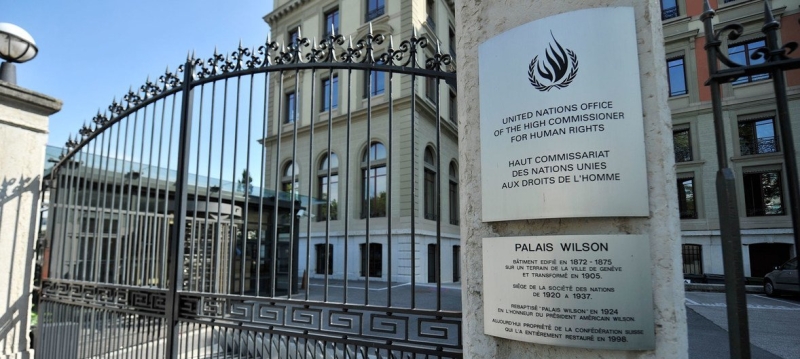
Office of the United Nations High Commissioner for Human Rights, Geneva The UN Committee on the Elimination of Racial Discrimination has published its conclusions on the situation in Belarus and other countries Human Rights
The UN Committee on the Elimination of Racial Discrimination has published its latest findings on the situation in Belarus, Bosnia and Herzegovina, Iran, Iraq, Pakistan, the United Kingdom and Venezuela. In a document released on Friday, the committee identifies key problems in this area and provides its recommendations on how these countries should implement the International Convention on the Elimination of All Forms of Racial Discrimination.
Belarus
The Committee stressed its concern about the “life-threatening” conditions faced by migrants, asylum seekers and refugees at the border of Belarus with the European Union. The authors of the report cite reports of excessive use of force, arbitrary detentions and difficulties in accessing asylum procedures.
The Committee called on Belarus to take immediate measures to protect the lives and safety of people at the border, prevent excessive use of force and ensure that border guards and law enforcement officers are trained in human rights.
The Committee expressed concern about reports that members of national and other minorities in Belarus face administrative and other restrictions on freedom of association and the exercise of their religious, linguistic and cultural rights, including the dissolution of minority public organizations, the closure of their schools and the cancellation of cultural events.
The Committee urged the Belarusian authorities to ensure that members of national and other minorities fully enjoy freedom of association, access to education in Polish and Lithuanian, and freedom to practice their religion.
Read also:
UN experts praise new Belarus law on rights of persons with disabilities, express concern over closure of NGOs
Bosnia and Herzegovina
The Committee remains concerned about persistent discrimination and marginalization of Roma (Gypsies) people in Bosnia and Herzegovina. Key challenges include poor living conditions, limited access to public services and jobs, especially for Roma women, inadequate health care and low education enrolment rates for Roma children.
The Committee urged Bosnia and Herzegovina to intensify its efforts to combat systematic racial discrimination against Roma, improve their housing and living conditions, provide them with employment and vocational training. The Committee also recommended that culturally sensitive health services be provided to Roma, especially women and girls.
Pakistan
Noting the escalation of incidents in Punjab and Khyber Pakhtunkhwa between May and June 2024, the Committee stressed its concern about accusations of blasphemy and subsequent lynchings and destruction of places of worship targeting ethnic and ethno-religious minorities. The Committee noted the impunity for these crimes, the low number of arrests and convictions.
The Committee is alarmed by the mass exodus of people under Pakistan’s illegal aliens repatriation plan, under which more than 700,000 people have been deported to Afghanistan.
Iran
The Committee expressed grave concern at reports of grave human rights violations and abuses committed by law enforcement officials against protesters belonging to ethnic and ethno-religious minorities during the protests in November 2019, July 2021 and September 2022, particularly in provinces predominantly inhabited by minority groups. It urged Iran to immediately conduct an impartial investigation into the allegations of human rights violations and abuses committed by the security forces during the protests and to provide compensation to the victims.
Iraq
The Committee expressed concern at reports that the decision to close all camps for internally displaced persons (IDPs) in Iraq by the end of 2024 could lead to the forced return of IDPs from ethnic and ethno-religious minority groups. The Committee urged Iraq to ensure that return or resettlement was safe and genuinely voluntary.
United Kingdom
The Committee noted the continuing incidence of hate crime and xenophobic speech on various social media platforms and from politicians and public figures in the UK. The Committee members noted the recurrence of racist attacks and violence against ethnic and ethno-religious minorities, migrants, refugees and asylum seekers by extremist far-right groups.
The Committee urged the UK authorities to take comprehensive measures to combat racist and xenophobic rhetoric and stressed the need to thoroughly investigate and ensure that racially motivated hate crimes are punished severely and that victims and their families are provided with effective remedies.
Venezuela
The Committee expressed grave concern about the negative impact of mining activities in Venezuela on indigenous peoples’ lands and their livelihoods. It urged the Venezuelan authorities to refrain from deploying armed forces and conducting military operations in indigenous territories without prior consultation with their representatives, and to establish effective mechanisms for accountability for possible human rights violations in this area.
The Committee expressed grave concern about alleged acts of violence, threats and attempted murders of indigenous and Afro-descendant human rights defenders. It called on Venezuela to immediately cease persecution of human rights defenders, prevent all acts of violence, threats and attacks on their lives, and investigate all allegations of violence, intimidation and defamation against them.
